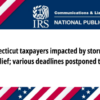Following approval of Connecticut’s first model statewide curriculum, the State Education Resource Center (SERC) has released a documentary to inform communities, families, schools, and the general public about the course development process led by SERC.
The CT State Board of Education approved the African American/Black and Puerto Rican/Latino high school course of studies last month, as required by a state law signed in June 2019 that authorized SERC to develop and submit course curriculum materials by January 2021. The requirement is included in Public Act 19-12 – the law that directs all regional and local boards of education to include an elective course of studies at the high school level that provides students with a better understanding of the African-American, Black, Puerto Rican, and Latino contributions to United States history, society, economy, and culture.

The 36-minute film features the voices of a wide range of stakeholders involved in the effort, including educators, public officials, advocates, focus group participants, and Connecticut residents who testified at public hearings in support of the legislation.
The 150-member advisory group convened by SERC included K-12 and college educators, historians and museum representatives, parents, students, community advocates, and the lawmakers who sponsored Public Act 19-12, State Senator Douglas McCrory, State Representative Bobby Sanchez, and State Representative Bobby Gibson. In the documentary, they explain the reasoning behind the course, how it came about, the purpose behind its structure, and their vision for education in Connecticut that reflects diverse perspectives.
“I am moved by the fact that I represent an organization—the State Education Resource Center—that has been selected to coordinate this effort,” SERC Executive Director Ingrid M. Canady says in the documentary, from a February event with lawmakers at the State Capitol. “And we are honored by this task, that I cannot even call it a task. I have to call it ‘history in the making’.”
“Identities matter, especially when 27 percent of our students identify as Hispanic or Latino and 13 percent identify as Black or African-American,” commented Miguel Cardona, Connecticut’s Education Commissioner when the curriculum was announced in December, shortly before he was named by then-President Elect Joe Biden as the nominee for U.S. Secretary of Education. “This curriculum acknowledges that by connecting the story of people of color in the U.S. to the larger story of American history. The fact is that more inclusive, culturally relevant content in classrooms leads to greater student engagement and better outcomes for all.”
The short film, Making History: The creation of a statewide Black and Latino Course of Studies per CT PA 19-12, as well as additional information about the curriculum development, is available at www.ctserc.org/pa1912.

The adopted curriculum focuses on a two-pronged, inquiry-based approach, including both content knowledge and student identity development. It utilizes Connecticut’s Social Studies Framework themes and inquiry-based approach already familiar to social studies teachers to deliver a content rich and personalized learning experience.
High schools may offer the course in 2021-2022 and will be required to offer it during the school year that begins in the fall of 2022. Some Connecticut communities have indicated they plan to make the new course available to students this fall.
“Increasing the diversity of what we teach is critical to providing students with a better understanding of who we are as a society and where we are going,” Governor Ned Lamont said of the new curriculum. “Adding this course in our high schools will be an enormous benefit not only to our Black and Latino students, but to students of all backgrounds because everyone can benefit from these studies.










